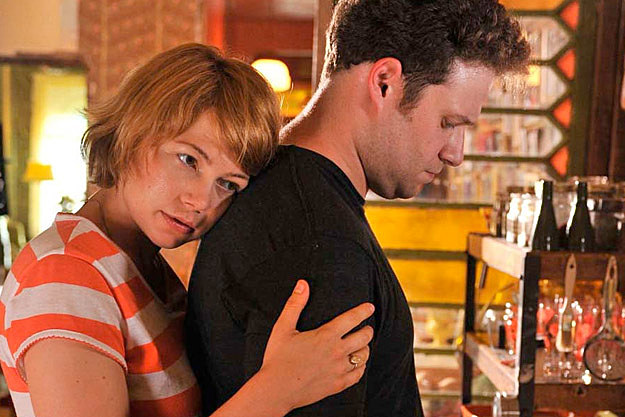In the opening minutes of Take This Waltz, the movie's young protagonist comments that she doesn’t like "being in between things." Mmm. Even when life is good, it's a long, hard slog toward happily ever after. Director-writer Sarah Polley's condescension-free drama presents a stirring, searing portrait of a woman destined for disappointment.
Margot (Michelle Williams) is married to Lou (Seth Rogen), a
likable cookbook writer whose specialty is chicken dishes. The couple lives in
a charming house in a trendy, colorful Toronto neighborhood. They seem happy
together, though after five years of marriage complacency has set in: eating in
front of the TV, going to the bathroom together. In short, they're like
everybody else.
After a business trip, Margot isn't so sure. She ran into a
handsome, confident stranger (Luke Kirby) whom she ended up sitting next to on
the plane ride home. The shameless flirting continued when they shared a cab.
Before exiting, she put an end to the fantasy sabbatical. "I'm
married," she says. "It's too bad," Daniel responds,
"because I live here."
A week ago, Margot didn't know Daniel, an artist and
rickshaw operator, existed. Now, he's everywhere. She gets up early to go food
shopping and runs into him getting ready for work. He invites her to his place
for coffee. "You seem restless, not now but in a kind of permanent
way," he says. She talks of being suddenly sad when she submits to
the beauty of the everyday. Daniel suggests that those feelings come from
something less abstract. His directness is a warning to Margot—stay away—that
she misses. Perhaps she only sees positive messages in allegories. In any case,
she becomes hopelessly enamored with Daniel.
Thanks to Polley's confidence with the material, Margot
isn't a dope or a victim. She's just hopelessly naïve. When she snuggles
against Lou while he's cooking, she takes his rebuke seriously, not thinking
that he might be too busy. Lou, moody and gruff, could be more affectionate,
but he's a good man. He would come around sooner if Margot took initiative,
which explains her infatuation with Daniel. He's always there. He shows
up at a ridiculous aqua aerobics class, where a laughing jag causes Margot to
pee in the pool. He talks dirty to her when they meet for martinis
afterward. But she must commit to leaving Lou. She can't imagine eliminating
her possibilities; the concept of could-have-been paralyzes her. The grass is
greener everywhere. "It's [time] for you to do something,"
Daniel tells her, "not me." Believe it or not, Daniel is the movie's
voice of reason, and his intentions with Margot aren't exactly noble.
Margot is not a particularly likable character, but Williams
makes us care about her. The actress can worm inside the skin of sad souls (Blue
Valentine, My Week with Marilyn) and bring out their despair with
painful, poignant subtlety. Her work in Take This Waltz pads the resume.
No one creates more impact with less histrionics than Williams; her use of
expressions to convey everyday despair always amazes me. Rogen dampens his
sarcasm to deliver a sympathetic performance that doesn’t wilt against
Williams's ill-advised yearning. Kirby manages to be predator-like and
dignified in his courtship. The biggest surprise here is Sarah Silverman. The
comedian uses her bite to compelling effect as Margot's sister-in-law, who is a
clear-eyed realist even when she's drunk.
Polley doesn't fashion an I-told-you-so retort to every Kate
Hudson movie as much as show that marriage is not a lifelong stretch of bliss.
Sometimes it's boring. Sometimes it's fun. Occasionally there will be an
argument…or no dialogue whatsoever. A handsome, artsy neighbor whom you see
everywhere and a few sexless nights don't necessitate wholesale change. Movies
frequently advise that breaking free from a cycle of blandness will lead to
unimagined happiness. According to Polley (Away from Her), it's not that
simple. It's easier, perfectly OK even, to revel in possibilities. Polley, in
fact, presents Margot with multiple opportunities to opt for the lovely realm
of what-if. It's a sign of how good Take This Waltz is that we pray
Margot sees what Polley does—that all couples, regardless of how intoxicating
their initial attraction, are together in the same way. [R]


No comments:
Post a Comment